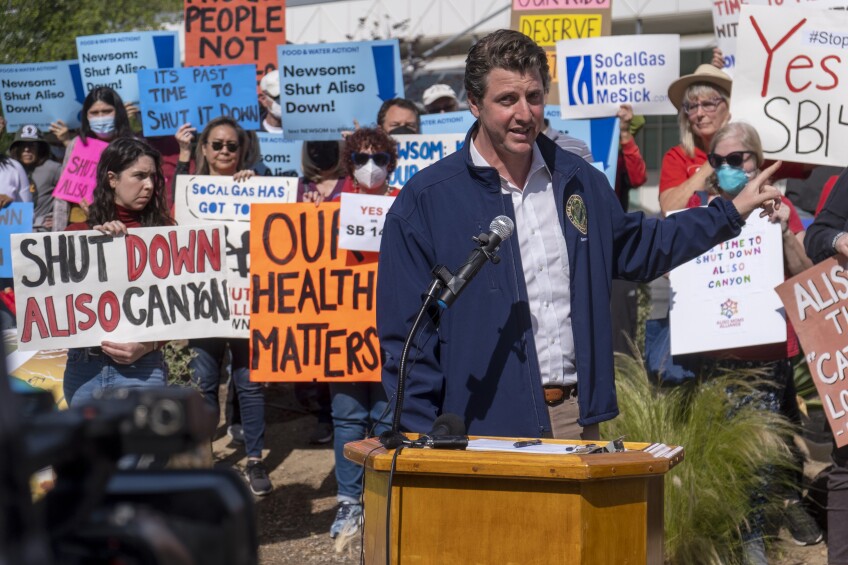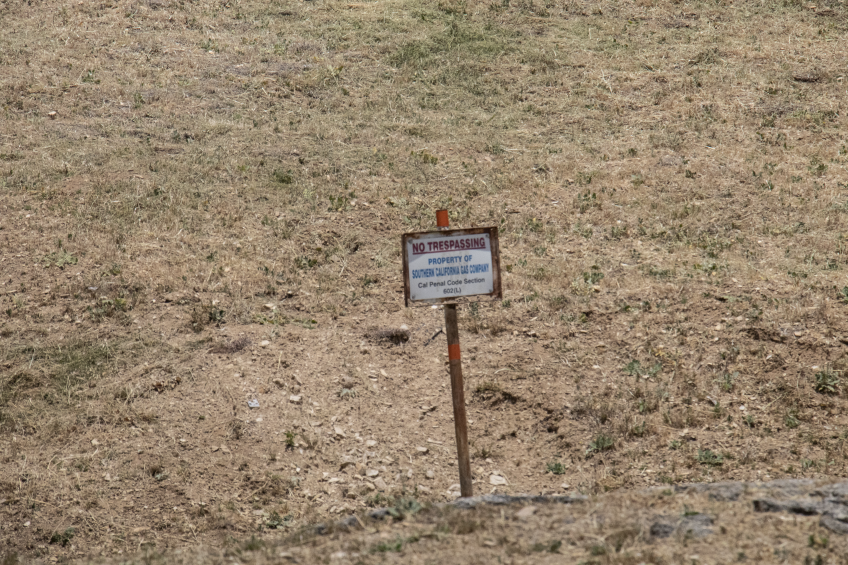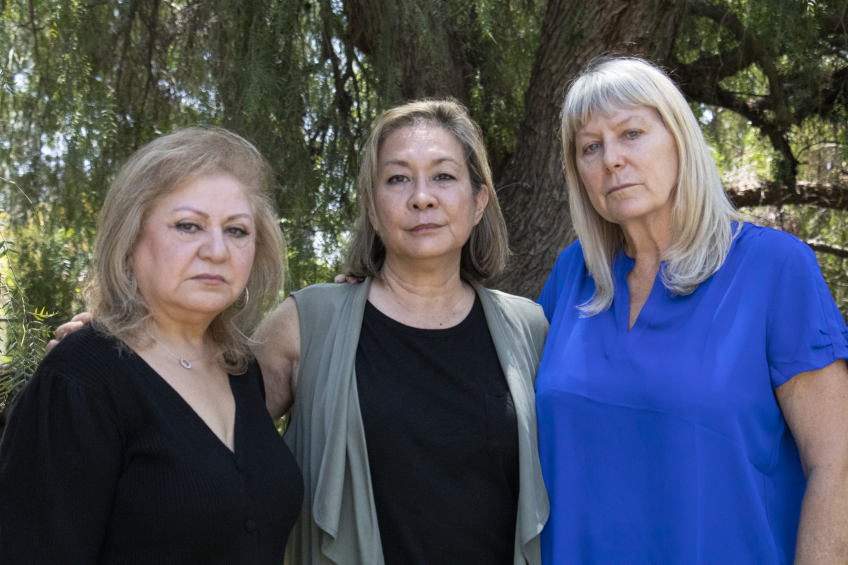A Rocky Path Ahead for Aliso Canyon Gas Storage Facility Shutdown

A piece of legislation that would have streamlined the closure of the Aliso Canyon, the underground gas storage facility responsible for the biggest gas leak in U.S. history, was gutted by the California Senate Appropriations Committee last Thursday.
Residents of Porter Ranch — the neighborhood next to Aliso Canyon — and environmental groups say it's now up to Governor Gavin Newsom to live up to his promises and use his authority to close the facility down.
“We need Governor Newsom to take up this fight for the sake of justice and his climate agenda,” said Andrea Vega, Southern California Organizer with Food & Water Watch in a press statement. “We can’t have either as long as Aliso Canyon is still operating.”
Senate Bill 1486 — also known asthe Clean Energy Jobs, Coordination and Community Safety Through Aliso Canyon Closure Act — was introduced by Senator Henry Stern (D-Calabasas). It would have set a 2027 deadline for the California Public Utilities Commission (CPUC) and Southern California Gas Company (SoCalGas) to close Aliso Canyon and would have restricted natural gas injections at the facility until its shutdown.
In addition, SB 1486 would have mandated protections and safeguards for SoCalGas workers to transition to clean energy jobs and directed the company to work with the CPUC, California Independent System Operator (CAISO), Southern California Edison and the Los Angeles Department of Water and Power (LADWP) on a natural gas reduction plan for Southern California. About 80 climate and environmental organizations signed letters of support for the bill, while only a handful of groups — including the Utility Workers Union of America — expressed opposition.
On Thursday, amendments to the bill made by the Appropriations Committee changed the deadline for Aliso’s closure to 2045 and nixed language about pauses on gas storage at the site. Amendments also called on the CPUC to work with state and local agencies to consider investments in “clean hydrogen” to help meet energy demands in the absence of Aliso Canyon. The CPUC is currently investigatingthe feasibility of phasing out the facility, as required by Senate Bill 380.
Climate organizers call the amendments a “huge betrayal and disappointment” by the Appropriations Committee and Senate leadership.
“This completely blindsided us,” said Vega in a telephone interview with KCET. “We weren’t expecting the kind of amendments that were made. Unfortunately, the bill’s original purpose is just not there anymore.”
One thing that is certain, Vega said, is that the current bill with its new amendments is “not a viable path moving forward.”
“For many community members, this is crushing,” said Vega. “This bill was a beacon of hope.”
Sempra Energy, which owns SoCalGas, spent $1.9 million during the first quarter of 2022 lobbying against climate and natural gas-related bills in the state legislature. In recent years, they have used ratepayer money to help fund lobbying campaigns and were fined nearly $10 million for misusing those funds.

When approached for comment, a SoCalGas spokesperson said that the company supported efforts by the CPUC to continue its investigation of Aliso Canyon’s long-term viability. They also promoted the recently proposed Angeles Link green hydrogen pipeline system, which SoCalGas claims will support Aliso Canyon’s ultimate retirement.
“Clean alternative fuel, like the green hydrogen Angeles Link would deliver, would, over time, reduce demand served by Aliso Canyon and create an actionable plan to displace natural gas that, along with other necessary clean energy projects, would reduce the need for the facility and still provide reliable and affordable energy to our customers,” said SoCalGas spokesperson Christine Detz in an emailed statement.
Environmentalists have recently expressed concern over SoCalGas’ hydrogen initiatives, saying that such proposals will block the path toward electrification and continue to create nitrogen oxide pollution, despite not emitting carbon.
“[The amendments] are SoCalGas’ latest scheme to push hydrogen. There’s truly no end to their greed and disregard for human health,” said Vega.
In October 2015, a gas well failure at the Aliso Canyon Gas Storage released over 100,000 tons of methane, ethane and other chemicals into the air for about four months, impacting the health of residents living in and near Porter Ranch.
Learn More About the Gas Leak
Bloody noses, nausea, headaches and cancer continue to impact families who for years have called on SoCalGas, elected officials and the CPUC to close the gas storage facility. Many residents say they still continue to smell gas. Despite all this, the CPUC voted unanimously last November to expand gas storage at Aliso Canyon to 60% capacity or 41.6 billion feet.
“They claim that they have done so much to make this facility the safest in the U.S. But, the other night — 10 days ago — I had friends over and I smelled gas,” said Helen Attai, a resident of Granada Hills and a community leader with Aliso Moms Alliance. “And I began to have a really bad headache. I then asked our group chat and several people said they also didn’t feel well. One person even posted a photo with a nose bleed.”

Attai and her Aliso Moms Alliance colleagues have grown frustrated with the lack of inaction from local and state agencies on Aliso’s closure and want Newsom to prioritize “lives over profit.”
“We’ve spoken to him personally and he has promised us to close this down as soon as possible,” said Deidre Bolona of Aliso Moms. “But it’s been nothing but platitudes.”
SB 1486 was Senator Stern’s second attempt to use legislation to speed up the closure of Aliso Canyon; Stern first became involved with the Aliso Canyon disaster as a senior advisor for former Senator Fran Pavley. He said closing Aliso is a “high stakes” battle that continues to be the daily focus of his office and residents. Stern said the bill provided a “critical test” for state leaders to begin making the shift to renewable energy.
“[This bill] is the only insurance we have right now to make sure that the Governor follows through on his commitment,” Stern said during a phone interview on May 10. “Are we willing to do the hard part now? We feel that we need to make that clean energy shift immediately.”
Vega said Newsom openly claimed he supported a 2027 closure of Aliso Canyon back in 2019.
“There’s been no follow-through from him,” she said. “It has us wondering if it’s even a priority. His silence speaks volumes.”



